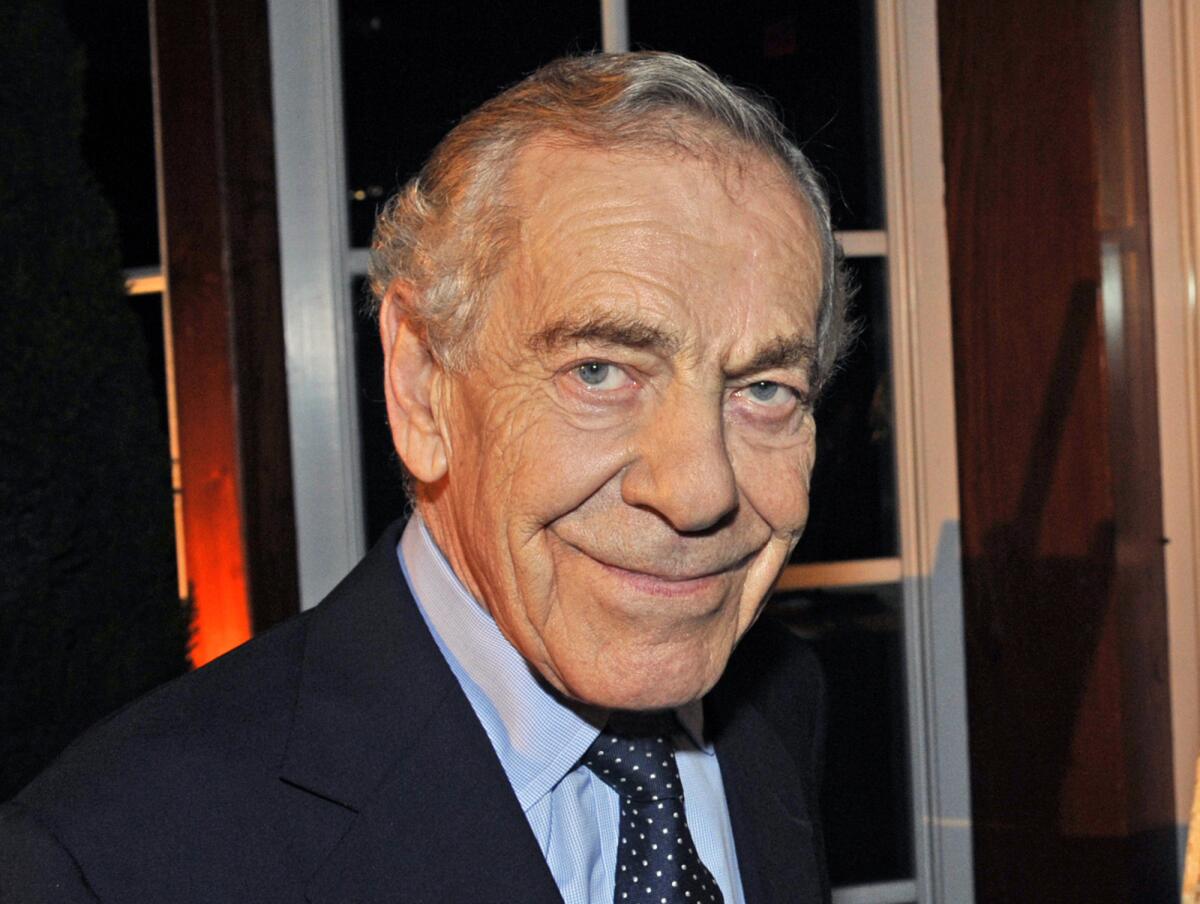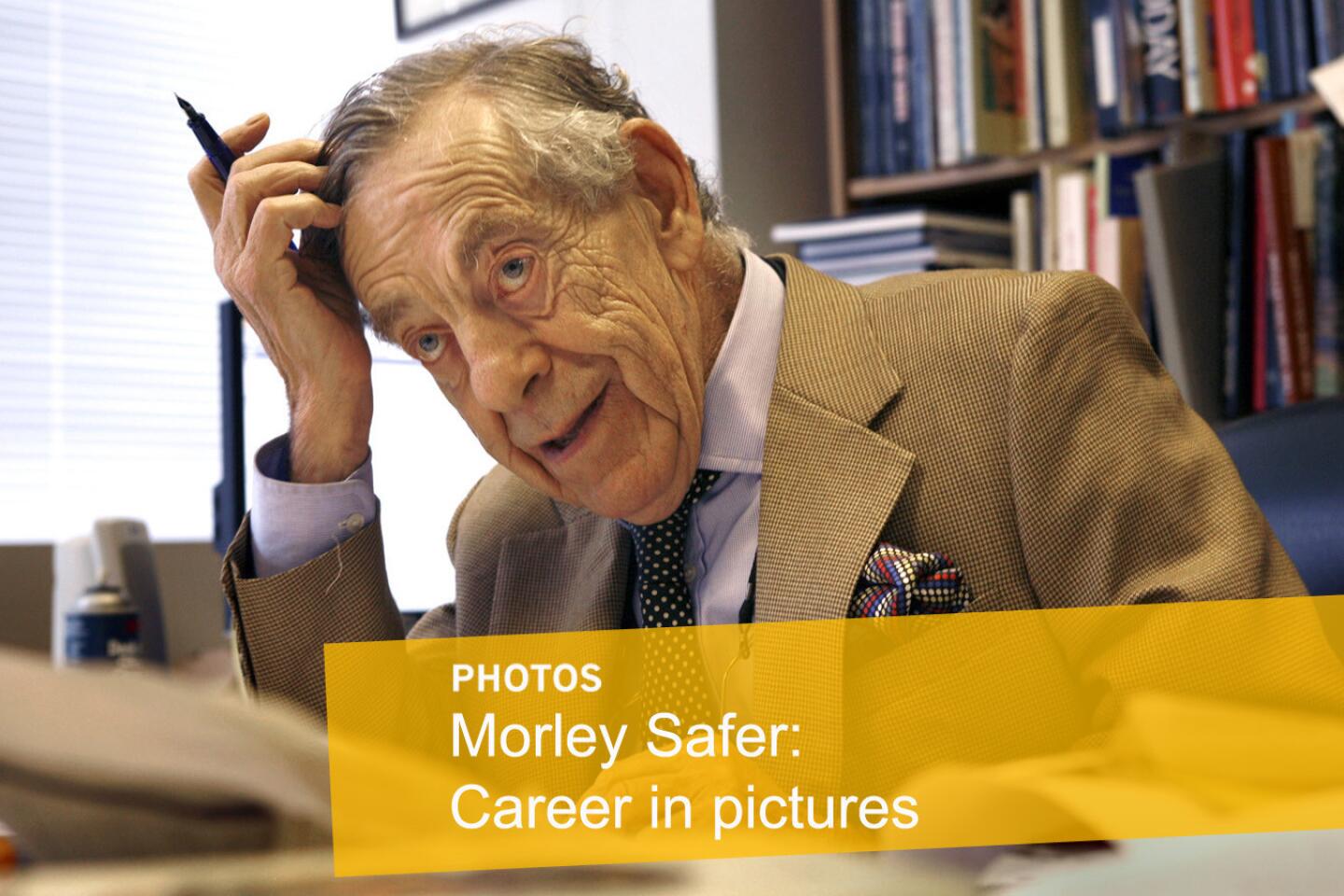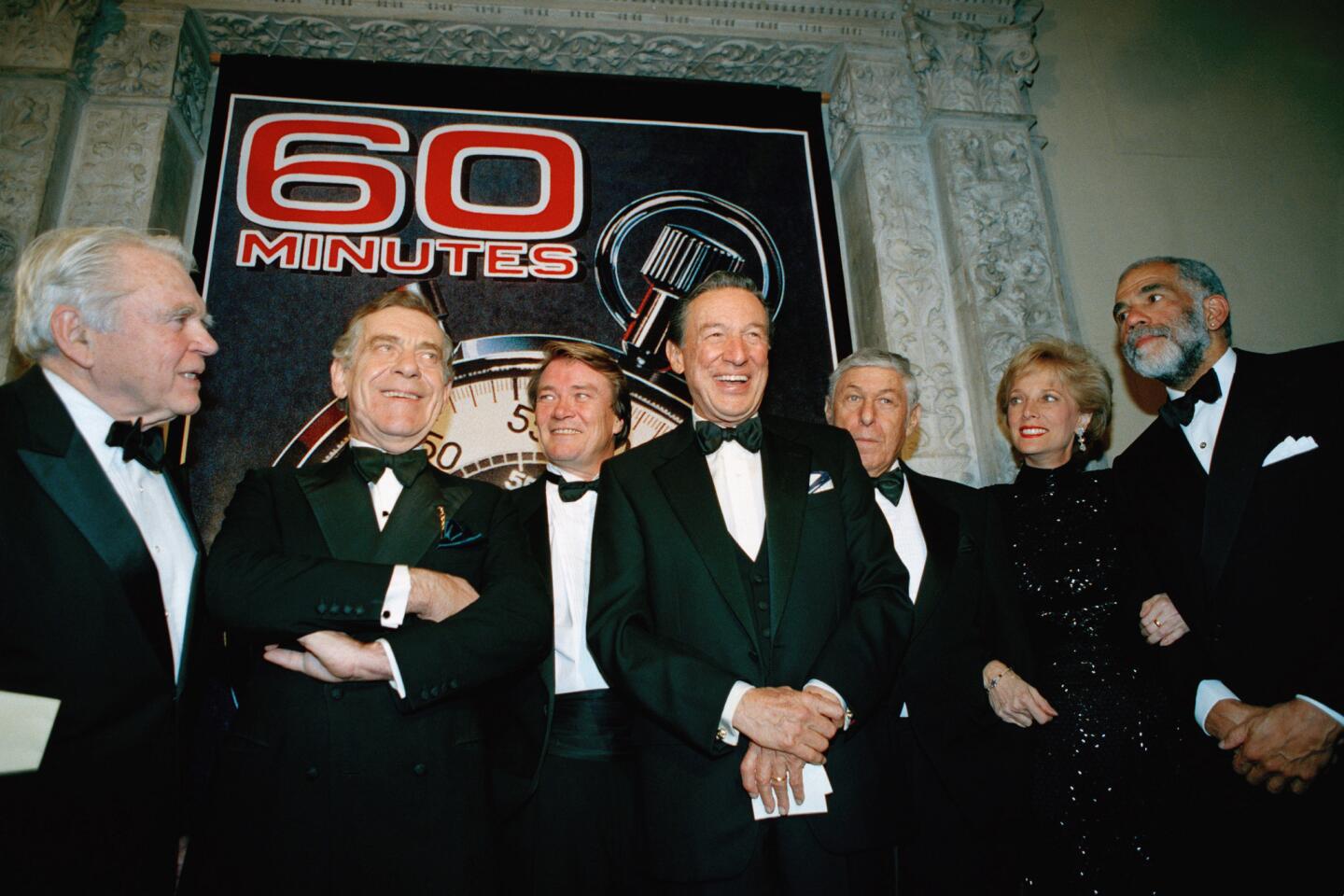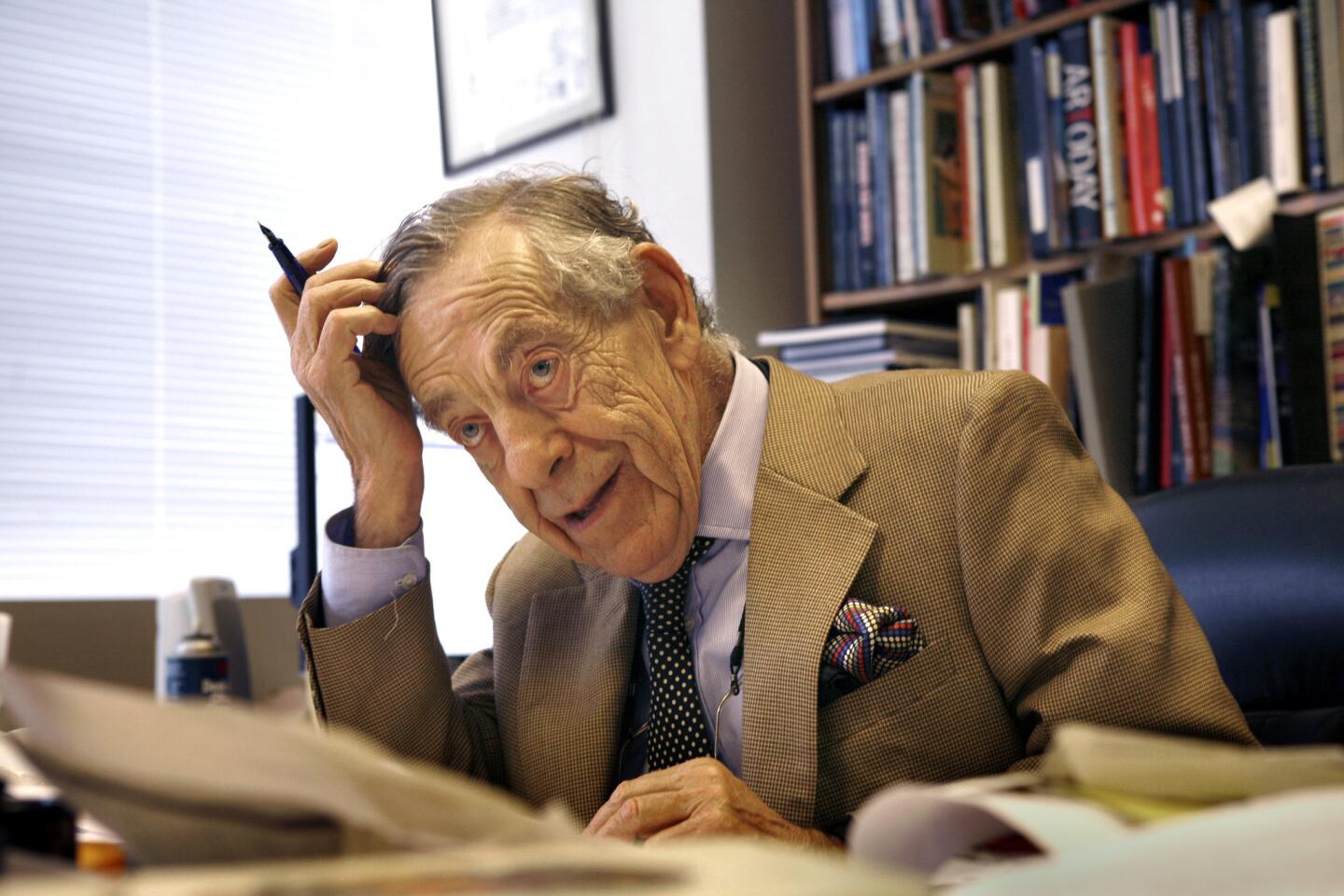Morley Safer dies at 84: A reluctant voice on camera, he changed television news

“60 Minutes” correspondent Morley Safer during the program’s 40th anniversary celebration in New York on Oct. 6, 2008.
In his mind, Morley Safer wasn’t a television newsman. He didn’t have an affinity for the camera and, in fact, admits he simply wasn’t fond of it. He was a reporter, and telling a story was all he wanted to do.
“I really don’t like being on television,” Safer confessed last week in what amounted to an exit interview that aired in an episode-length tribute to his work on “60 Minutes.”
“It is not natural to be talking to a piece of machinery.”
With a craggy, time-weathered face, cigarette-burnished voice and a deep well of elegant yet unsparingly economical turns of phrase at his command, Safer produced a body of work spanning more than 60 years that casts a long shadow in an industry he helped define.
His work became the cornerstone of investigative television reporting. Despite his reservations about being on camera, Safer looked natural week after week, extending a lineage of tireless reporting paired with an unquenchable, deeply human curiosity that extended to similarly influential network counterparts Walter Cronkite and Edward R. Murrow. And like Cronkite and Murrow, Safer became part of a group of journalists who set the tone for storytelling on television.
Safer, who announced his retirement from “60 Minutes” on May 11, died at his Manhattan home on Thursday, leaving behind a television landscape that constantly changed around him yet never seemed to leave him behind. He was 84.
“Morley was one of the most important journalists in any medium, ever,” said CBS Chairman and CEO Leslie Moonves. “He broke ground in war reporting and made a name that will forever be synonymous with ‘60 Minutes.’ ”
Jeff Fager, executive producer of “60 Minutes” and one of Safer’s close friends, called the longtime reporter “one of our pillars and an inspiration in many ways.” Fager added: “He was a master storyteller, a gentleman and a wonderful friend.”
After 52 years with CBS and logging 919 news stories with “60 Minutes” alone, Safer was ready to say goodbye. “It’s been a wonderful run,” Safer said in his retirement statement last week.
His coverage of the Vietnam War early in his tenure with CBS earned him awards, accolades and the wrath of the president. He joined the network’s Saigon bureau in 1965. There he served three tours, often taking fire and offering firsthand accounts with the troops, including a report filed after his helicopter crashed near enemy lines and a story on U.S. Marines burning the village of Cam Ne as retribution for a sniper attack.
Morley was one of the most important journalists in any medium, ever.
— Leslie Moonves, CBS Chairman and CEO
The award-winning report, which aired on Walter Cronkite’s nightly news program, incurred the wrath of President Lyndon Johnson, who called the network’s president demanding that Safer be fired. The network stood by Safer, eventually assigning him to replace Harry Reasoner as Mike Wallace’s partner on “60 Minutes” during the show’s third season in 1970.
Despite flagging ratings in the show’s early days, Safer remained a linchpin of the show for 46 years, holding the longest tenure on prime-time television of anyone in history.
Safer and Wallace quickly made an impression, earning an Emmy in 1971 for their investigation of the Gulf of Tonkin incident that spurred America’s entry into the Vietnam War.
As the show moved to its long-held position on Sunday evenings in 1975, Safer helped put the show on the map even more indelibly with a far-reaching interview with First Lady Betty Ford.
“60 Minutes” was a top 10 show in the Nielsen rankings in 1978, and the show hit its stride with hard-hitting interviews balanced with elegant, often unconventional features from Safer, who traveled the globe for intimate, patiently drawn segments that included riding the Orient Express, exploring a tango club in Finland and examining Italy’s Casa Verde, a retirement home for often cantankerous opera singers.
Safer also offered a variety of probing celebrity interviews, including shooting pool with Jackie Gleason and questioning Alec Baldwin after a 2007 scandal over an enraged phone message to his daughter.
Born in Toronto on Nov. 8, 1931, and falling under the spell of the world-spanning work of Ernest Hemingway, Safer dropped out of the University of Western Ontario to pursue his craft as a journalist, working at various small town newspapers as well as stints overseas in Oxford and London.
He joined the ranks of TV journalists when he was hired in 1955 as an editor and reporter at the Canadian Broadcasting Company in Toronto, the nation’s broadcast network.
Though initially skeptical of shifting to TV news, he quickly took to it as a foreign correspondent, traveling around Europe, the Middle East and Africa while covering the Suez Crisis between Egypt and Israel as well as the construction of the Berlin Wall in 1961.
In 1964, he caught the eye of CBS and was hired to join the network’s London bureau, taking over at the very same desk once anchored by Murrow, who in addition to his other achievements as an era-defining journalist was the voice of the network from England during WWII.
He was a master storyteller, a gentleman and a wonderful friend.
— Jeff Fager, executive producer of “60 Minutes”
“There was a lot of baggage,” Safer said of following in Murrow’s footsteps in London. “Wonderful, positive baggage.”
At “60 Minutes,” Safer’s deeply held sense of curiosity, ear for humor and eye for offbeat could make it tempting to place him as a counterweight to Wallace, whose brusque style played a large part in “60 Minutes’” reputation for “gotcha” investigative reports (after all, it was a Saturday Night Live impression of Wallace, not Safer, who traumatized an interview subject played by Martin Short in a memorable 1984 sketch).
However, Safer’s favorite story was his 1983 report “Lenell Geter’s in Jail,” an examination of the shoddy criminal investigation of an armed robbery in Texas that led to a young black man being sentenced to life in prison.
The conviction was overturned days after the report, which earned Safer and the network multiple honors, including a Peabody Award.
CBS News President David Rhodes said: “Morley Safer helped create the CBS News we know today. No correspondent had more extraordinary range, from war reporting to coverage of every aspect of modern culture. His writing alone defined original reporting.”
Indeed, for all the visual possibilities in Safer’s ultimately chosen medium of television, his most valued aspect of his job remained putting words on the page, which he continued to do on a classic Royal typewriter up until very close to his retirement.
“I have a pretty solid body of work that emphasized the words, emphasized ideas and the craft of writing for this medium,” Safer said in a 2000 interview with the Archive of American Television. “It’s not literary, I wouldn’t presume to suggest that. But I think you can elevate it a little bit sometimes with the most important part of the medium, which is what people are saying.”
Safer is survived by Jane, his wife of 48 years, and a daughter, Sarah Bakal, who explored freelance journalism and photography, along with three grandchildren, a sister and a brother.
Times staff writers Ryan Faughnder and Stephen Battaglio contributed to this report.
ALSO:
Julian Assange film ‘Risk’ offers an inside look at controversial Wikileaks founder
Robert Shapiro reveals what O.J. Simpson said after his court verdict was read
At Cannes, Kristen Stewart reminds us why she’s one of cinema’s most promising young actresses
‘Game of Thrones,’ ‘Confirmation’ and ‘black-ish’ lead our 2016 Emmys Buzzmeter
Follow me on Twitter: @chrisbarton
UPDATES:
4:35 p.m.: This story has been updated throughout.
10:31 a.m.: This story has been updated with information about Morley Safer’s 1990 book “Flashbacks: On Returning to Vietnam.”
10:08 a.m.: This story has been updated with statements from CBS Chairman and CEO Leslie Moonves and “60 Minutes” executive producer Jeff Fager.
This story was originally published at 9:18 a.m.
More to Read
From the Oscars to the Emmys.
Get the Envelope newsletter for exclusive awards season coverage, behind-the-scenes stories from the Envelope podcast and columnist Glenn Whipp’s must-read analysis.
You may occasionally receive promotional content from the Los Angeles Times.















